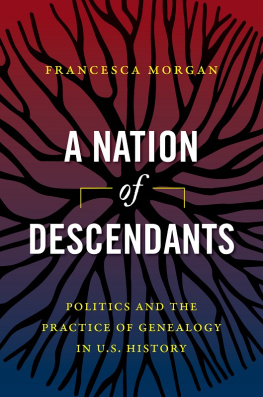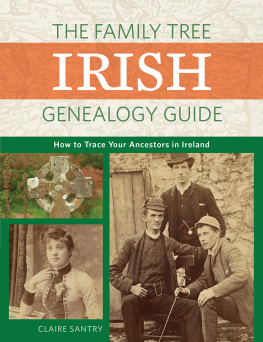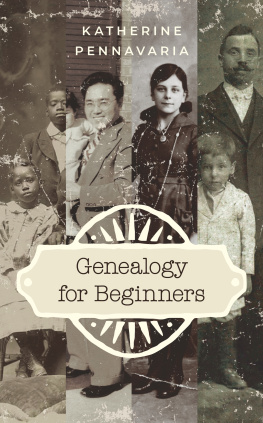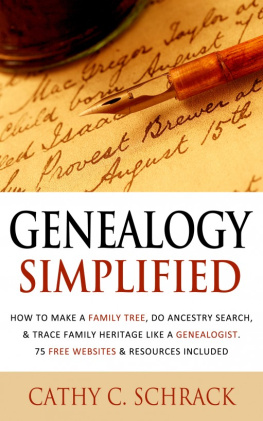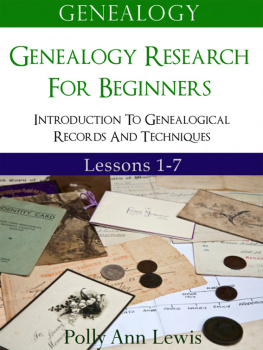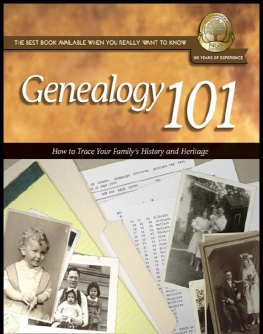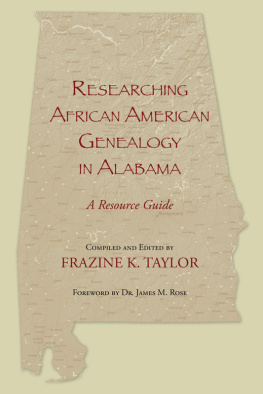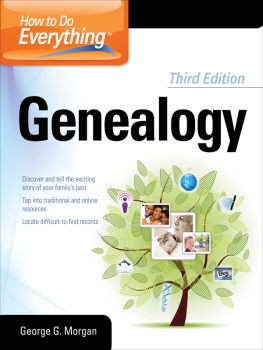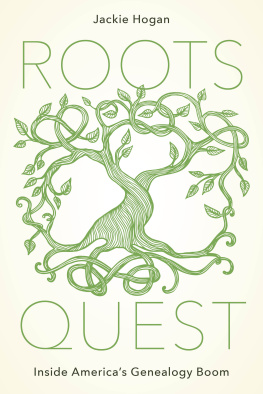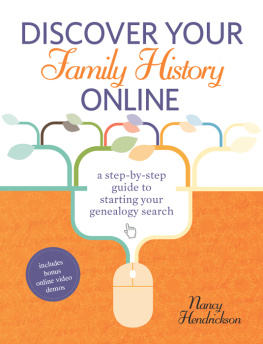Contents
Guide

A Nation of Descendants
FRANCESCA MORGAN
A Nation of Descendants
Politics and the Practice of Genealogy in U.S. History
The University of North Carolina Press Chapel Hill
2021 The University of North Carolina Press
All rights reserved
Set in Arno Pro by PageMajik
Manufactured in the United States of America
The University of North Carolina Press has been a member of the Green Press Initiative since 2003.
Library of Congress Cataloging-in-Publication Data
Names: Morgan, Francesca, author.
Title: A nation of descendants: politics and the practice of genealogy in U.S. history / Francesca Morgan.
Description: Chapel Hill : University of North Carolina Press, 2021. | Includes bibliographical references and index.
Identifiers: LCCN 2021004021 | ISBN 9781469664774 (cloth; alk. paper) | ISBN 9781469664781 (pbk.; alk. paper) | ISBN 9781469664798 (ebook)
Subjects: LCSH : Genealogy. | United StatesGenealogy.
Classification: LCC CS 47. M 67 2021 | DDC 929.1072/073dc23 LC record available at https://lccn.loc.gov/2021004021
Cover illustration: Branching pattern iStock.com/cienpies.
was previously published in a different form as A Noble Pursuit?: The Embourgeoisement of Genealogy, and Genealogys Making of the Bourgeoisie, in The American Bourgeoisie: Distinction and Identity in the Nineteenth Century , ed. Sven Beckert and Julia B. Rosebaum (New York, N.Y.: Palgrave Macmillan, 2010), 13552. Reproduced by permission of Palgrave Macmillan.
Portions of were previously published in My Furthest-Back Person: Black Genealogy before and after Roots , in RootsReconsidered: Race, Politics, and Memory , ed. Erica Ball and Kellie Carter Jackson (Athens: University of Georgia Press, 2017), 6379. Used by permission of University of Georgia Press.
For my mother
Contents
Part I
Arguments about Exclusion before the 1960s
Chapter One
I Could Love Them, Too: Genealogy Practices and White Supremacy 19
Chapter Two
Yours, for the Dead: Mormonisms Linking of Genealogy with Worship 52
Chapter Three
Hereditary Greatness: Early Genealogical Efforts among Native Americans, African Americans, and American Jews 68
Part II
Arguments about Inclusion: Spectacle and Commerce
Chapter Four
There Has Not Been Such a Book: Precedents for Alex Haleys Roots after 1945 89
Chapter Five
Diversification and Discontentment: Roots (19761977) and Its Afterlives 112
Chapter Six
Genealogy for Hire and for Profit 138
Chapter Seven
Chosen Kin versus Genetic Fetishism: The Traffic in Genealogy-Driven DNA Testing since 1998 162
Epilogue
Theres No Market for Being Told Were All Related: Genealogys Politics, Revisited 181
Illustrations
| AAHGS | Afro-American Historical and Genealogical Society |
| ASG | American Society of Genealogists |
| BCG | Board of Certification of Genealogists |
| DAR | National Society, Daughters of the American Revolution |
| GSU | Genealogical Society of Utah |
| IAG | Institute of American Genealogy, Chicago |
| IGI | International Genealogy Index |
| JGS | Jewish Genealogical Society |
| LDS | Latter-day Saints (Mormons) |
| NAACP | National Association for the Advancement of Colored People |
| NEHGS | New England Historic Genealogical Society, Boston |
| NGS | National Genealogical Society, Washington |
| NYGBS | New York Genealogical and Biographical Society |
| TJHS | Thomas Jefferson Heritage Society |
A Nation of Descendants
Americans ambivalent relationship to genealogy has perplexed outsiders from nearly the beginning. In 1840, the young French nobleman Alexis de Tocqueville (180559) cherished the notion that democracy-minded Americans had cast aside concerns about family background. Among democratic peoples new families emerge constantly out of nothing, while others constantly fall back into nothing, he wrote. The thread of time is broken at every moment, and the trace of past generations fades. You easily forget those who preceded you, and you have no idea about those who will follow you. Only those closest to you are of interest.
Elsewhere in Democracy in Americas second volume, though, Tocqueville portrayed Americans abroad as fascinated with lineage and eager to flaunt their own ties to long-ago worthies, as contemporaries called illustrious forebears.
Just as Tocqueville presumed that individuals manners could express broad national differences, I argue that even this particularly personal interest, namely genealogy, has been political, in the sense of reinforcing formal and informal group hierarchies. Hence this work constitutes a political history of genealogists and their practices. At first glance, the pursuit of genealogy seems so narrow as to resemble autobiography and so oriented toward specifics as to bore anyone else, except family members and people with an overlapping or similar surname.
My insistence that genealogys seemingly narrow, individualistic concerns illustrate Americans setting of us apart from them, depends on a range of meanings of the adjective political. These laws justified and reinforced African American disfranchisement; suppressed interracial marriage involving whites; encouraged the practice of eugenics, with the sterilization of incarcerated populations without their consent; dispossessed Indigenous populations; and suppressed immigration from southern and eastern Europe, and Asia, on a racially discriminatory basis.
The term political also contains informal meanings. In their everyday lives, Americans have used genealogy findings to enforce any number of social boundaries, particularly those interlocking hierarchies of race, class, and religion that placed white Protestants on top.
Genealogys political characterand genealogys uses for inscribing power relationsincreased over time. Genealogy underwent its first growth in popularity during the Gilded Age, between the 1880s and the 1920s, when Americans became ever-more convinced that heredity explained their own and others physical and mental characteristics, in keeping with the scientific Consequently, following Alex Haleys bestselling book and television miniseries Roots (197677), genealogy businesses began operating on a massive scale. Since 1999, DNA testing has reached a new level of commodification, following its enlistment for genealogy purposes. Genealogys business history illustrates the second political dimension that recent practices have reified. Big businesses not only rewarded those with disposable income but also sequestered information that had previously been widely accessible behind paywalls, and they threw their weight behind definitions of family that treasured procreation within heterosexual marriage at a time when same-sex, childless, and unmarried family formations were on the rise. In sum, businesspeople set the needs of the present-day descendant as consumer above the less-commercial, and sometimes anti-commercial, goals of historical knowledge and accuracy.
Some evidence complicates my framing of genealogys political and business histories. Even in an era of large-scale commerce, genealogists have consistently engaged in sharing, trading, and donating their time and information outright. These behaviors need more study. Dick Eastman, with his eponymous online newsletter, and Cyndi Ingle of Cyndis List (1996) have developed free online clearinghouses to dispense advice and advance research on particular families, surnames, regions and other places, and ethnic groups.

